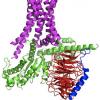Upon ingestion, a black hole opened up on my wall and Barack Obama popped out to ask me if I would come smoke a bowl with him. Just kidding, but now you know how "youthfully exuberant" I'm feeling with the addition of Idebenone.
The first day was incredible, so much energy and creativity. For some reason I decided to start playing sports left handed to see if I could become somewhat ambidextrous on Idebenone, and I actually had fun, whereas previous attempts were more frustrating without Idebenone. Things that I was more interested in as a child came rushing back to me, and I was up till 7am thinking about things I wanted to do. Not even 5mg of Melatonin helped. I woke up 5 hours later well refreshed.
Today is day 2 of taking 180mg (Primaforce) Idebenone with my Selegiline. I would probably prefer to take half a capsule but I really don't feel like popping it open every time and trying to "cut" the powder. Day 2 is pretty much the same as day 1. I think I'm realizing though that it's making my ADHD more difficult to control as I'm struggling to take the time to get important things done, if nothing else Idebenone is wonderful for anhedonia.
For those concerned about the oxidative effects of Idebenone, I might recommend taking Melatonin at the end of the day for its antioxidant properties and mitochondrial protection. Melatonin is not helping me sleep, however, but rather giving me a "blunted" feeling.
From http://www.ncbi.nlm....ubmed/11462772:
Free radical-mediated molecular damage. Mechanisms for the protective actions of melatonin in the central nervous system.
Reiter RJ, Acuña-Castroviejo D, Tan DX, Burkhardt S.
Source
Department of Cellular and Structural Biology, Mail Code 7762, The University of Texas Health Science Center At San Antonio, 7703 Floyd Curl Drive, San Antonio, TX 78229-3900, USA. Reiter@uthscsa.edu
Abstract
This review briefly summarizes the multiple actions by which melatonin reduces the damaging effects of free radicals and reactive oxygen and nitrogen species. It is well documented that melatonin protects macromolecules from oxidative damage in all subcellular compartments. This is consistent with the protection by melatonin of lipids and proteins, as well as both nuclear and mitochondrial DNA. Melatonin achieves this widespread protection by means of its ubiquitous actions as a direct free radical scavenger and an indirect antioxidant. Thus, melatonin directly scavenges a variety of free radicals and reactive species including the hydroxyl radical, hydrogen peroxide, singlet oxygen, nitric oxide, peroxynitrite anion, and peroxynitrous acid. Furthermore, melatonin stimulates a number of antioxidative enzymes including superoxide dismutase, glutathione peroxidase, glutathione reductase, and catalase. Additionally, melatonin experimentally enhances intracellular glutathione (another important antioxidant) levels by stimulating the rate-limiting enzyme in its synthesis, gamma-glutamylcysteine synthase. Melatonin also inhibits the proxidative enzymes nitric oxide synthase and lipoxygenase. Finally, there is evidence that melatonin stabilizes cellular membranes, thereby probably helping them resist oxidative damage. Most recently, melatonin has been shown to increase the efficiency of the electron transport chain and, as a consequence, to reduce election leakage and the generation of free radicals. These multiple actions make melatonin a potentially useful agent in the treatment of neurological disorders that have oxidative damage as part of their etiological basis. PMID: 11462772 [PubMed - indexed for MEDLINE]




















































